 Father Christmas is Back (2021)- The story of the Christmas family — four grown daughters and a mother — who’ve been trying to have a proper British Christmas for decades since their father, James Christmas, walked out on Christmas long ago. Now, suddenly, he shows up at the ancestral manse one daughter has married into — and he’s Kelsey Grammer! (Oh, he “lost” his British accent due to 25 years in the U.S. Either than, or the producers realized that Grammer couldn’t fake an English accent to hold his own with real Brits.) So everyone has to go through soul-searching and wound-healing, including brother John Christmas (John Cleese!). And the big question is still unanswered for most of the running time: Why did Dad leave?
Father Christmas is Back (2021)- The story of the Christmas family — four grown daughters and a mother — who’ve been trying to have a proper British Christmas for decades since their father, James Christmas, walked out on Christmas long ago. Now, suddenly, he shows up at the ancestral manse one daughter has married into — and he’s Kelsey Grammer! (Oh, he “lost” his British accent due to 25 years in the U.S. Either than, or the producers realized that Grammer couldn’t fake an English accent to hold his own with real Brits.) So everyone has to go through soul-searching and wound-healing, including brother John Christmas (John Cleese!). And the big question is still unanswered for most of the running time: Why did Dad leave?
For being a cute-but-not-a-romance made-for-TV Christmas flick, it’s not bad, and where else are you going to see Kelsey Grammer and John Cleese cast as feuding brothers?
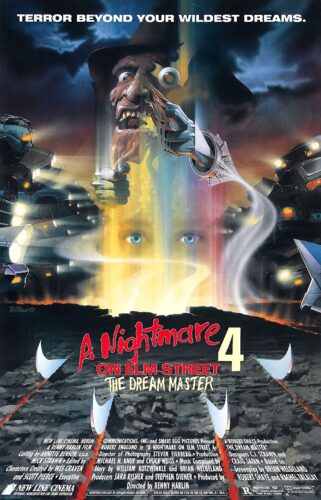 A Nightmare on Elm Street 4: The Dream Master (1988) – And now for the long slide into mediocrity. While this installment in the franchise is fun to watch, it exemplifies Samuel Johnson’s famous criticism: “Your manuscript is both good and original; but the part that is good is not original, and the part that is original is not good.” It apes Elm Street 3, and not in a good way.
A Nightmare on Elm Street 4: The Dream Master (1988) – And now for the long slide into mediocrity. While this installment in the franchise is fun to watch, it exemplifies Samuel Johnson’s famous criticism: “Your manuscript is both good and original; but the part that is good is not original, and the part that is original is not good.” It apes Elm Street 3, and not in a good way.
Yes, we’re going full-on into the “creative kills” idea, but we’ve lost what made those kills germane in the last movie; either they exploited a character failing (drug addiction, teenage lust, etc.), or they played with irony (like the marionette maker who gets turned into a marionette himself). In this one, though, the martial artist gets killed in a martial arts dream, the asthmatic gets her breath sucked away, etc. And to top it off, Freddy rarely bothers to scare his victims before he kills them.
(And let’s not even talk about the arbitrary way in which Freddy is defeated, okay?)
That’s not to say that the movie doesn’t look terrific; this was the first big-time project for director Renny Harlin, and it led into bigger and better things. But it doesn’t add to the franchise so much as simply continue it.
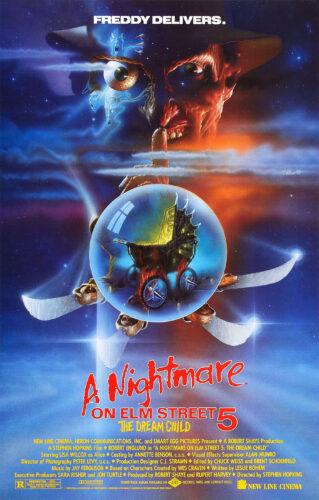 A Nightmare on Elm Street 5: The Dream Child (1989) – And further down we sink.
A Nightmare on Elm Street 5: The Dream Child (1989) – And further down we sink.
A big part of the problem is something that David Gerrold described as “the hardening of the arteries” of a franchise: The built-up rules of continuity (leaving out Elm Street 2, of course). It was established in Elm Street 3 and reinforced in Elm Street 4 that Freddy can only attack the children of his original vigilante killers; then, with Kristen giving her “dream power” of pulling other people into her dreams to Alice, heroine of Elm Street 4 and 5 (how, exactly, does that “giving” work?), Alice becomes the only way Freddy can attack other people… And so in Elm Street 5, it’s somehow Alice’s unborn dreaming baby whom Freddy can work through. We’re stuck with a Rube Goldbergian system of workarounds that doesn’t really say frisson to me.
And let me also say: I hate David Miller’s F/X makeup here. Miller originated Freddy’s look in the first Elm Street, but it was specifically designed to be mostly unseen or backlit. Jeff Yagher’s work through Elm Street 2 through 4 was meant to be more visible, and Elm Street 2 was the high point of it actually being disturbing:
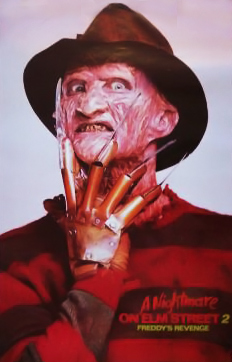
Those tight eye-sockets and the general translucency are ugly-ugly, not fun-ugly, as the look gradually became in 3 and 4:
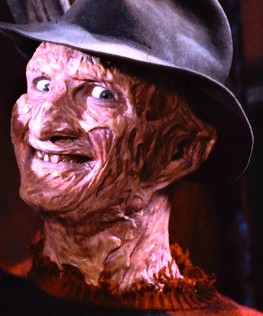
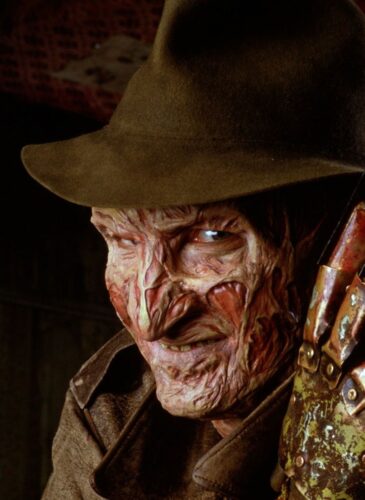
But in 5, Miller went back to the opaque, wrinkly look he used in the original, plus made him both clean and cartoonish:
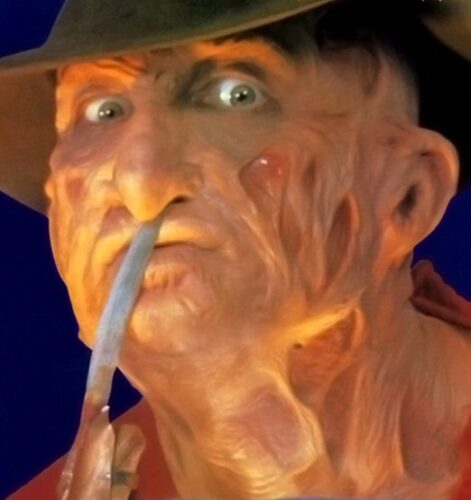
And you can’t see it well in that photo, but he also put dark circles around Freddy’s eyes which them look even larger, like a raccoon.
As far as the plot goes, it strikes me that the concept would have better made an alternate Elm Street 4 (where Kristen herself gets pregnant and Alice doesn’t exist) than a follow up to Elm Street 4. Especially because one of the few good parts of Elm Street 5 is the focus on Amanda Krueger that follows from Elm Street 3, and the interesting but underused parallels between Amanda’s baby and Alice’s.
(Oh, and whose idea was it to finish the movie with an Escher chase that not only had nothing to do with what came before, but merely seemed derivative of the climax of Labyrinth?)